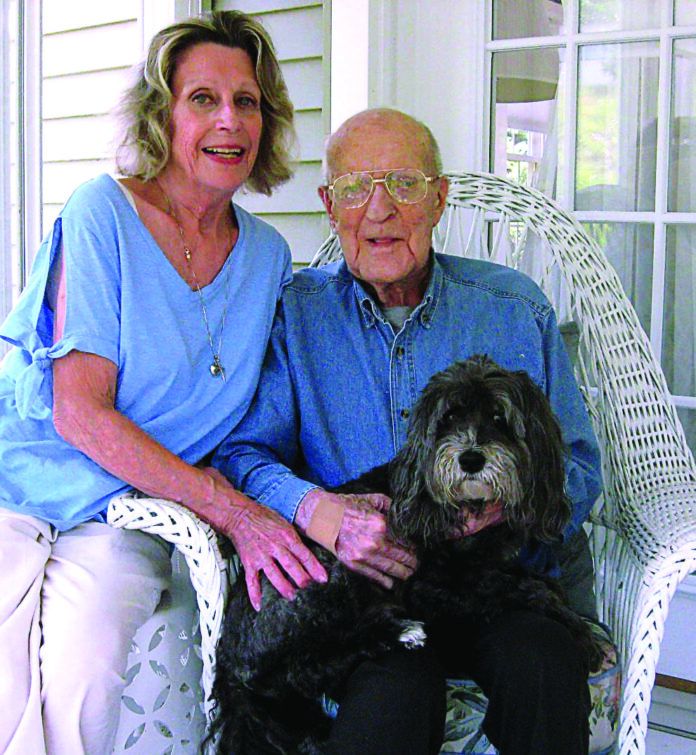Our recent article stating that it’s okay for a senior citizen to adopt a dog particularly resonated with Sue and David Barnard of western Massachusetts. “In 2014,” Mrs. Barnard wrote, “my husband and I filled out several adoption forms at area shelters. These applications asked for our ages. At the time, Dave was 88, and I was 74, and although not stated overtly, there seemed to be some concern that we would not be able to provide a dog with a ‘forever home.’ We were passed over several times.
“When we did find a shelter that accepted us, we adopted our delightful Pepper, a lively cocker spaniel/poodle mix who was then five and a half years old. (He had some anxiety issues, and we took him to Tufts animal behaviorist Dr. Stephanie Borns-Weil, a member of your editorial board, for help.) Pepper is now thirteen and a half, has kidney disease, a dislocated hip, and is deaf. Despite all of that, he is happy, frisky, and doing well, although we know that even with the best of care his time with us is measured.
“Sad as it will be to lose Pepper, it is also sad to think that at 96 and 82, perhaps we will not be considered as adoptive parents. I have had dogs my whole life.
“When we adopted Pepper, we drafted a written agreement with our son and his wife so they would take care of Pepper if we were unable to do so. Pepper knows them and is comfortable with them, so they were a logical choice. And we made financial arrangements for his care should they become necessary.
“I am sure there are many dogs who either spend long months in shelters or are euthanized because they were not adopted. I have never had a shelter suggest or offer a document such as we had with our son and think this could be part of the process, rather than making pet ownership dependent strictly on age. Certainly, smaller or older dogs may be more appropriate for senior-seniors, but we all need each other, and we all have mutual and precious love and caring to give.”
Solutions to concerns about a dog adopter’s age
The good news, at least in Massachusetts, is that at this time, “there are not any dogs who are getting put to sleep because no one will adopt them,” says Emily McCobb, DVM, Director of the Shelter Medicine Program at the Tufts Cummings School of Veterinary Medicine. “I am all in favor of seniors adopting dogs — I think it’s good for the people as well as the dogs — but not because I am worried about the dogs here,” she says. The other New England states also appear to be experiencing low euthanasia rates at shelters, according to a national database called Shelter Animal Count, along with shelters in a smattering of other states around the country, including North and South Dakota, Oregon, and Arkansas.
But getting dogs out of shelters and into good homes remains a goal. So how can an older, or old, person who wants to adopt a dog make it easier to bring one home? The answer: Find a shelter that will work with you, as the Barnards did.
“There’s an enormous amount of variation” in how [shelters] operate, says Karina King, director of operations at the Dakin Humane Society in Springfield, Massachusetts. “It entirely depends on the organization. I’m on a lot of different boards and online forums, and there’s constant fighting about whether you can adopt out an animal to a senior person.”
Dakin itself is an open-adoption facility,” Ms. King says. “We don’t ask people their age. I would never want to be an age where you’re told you’re too old to adopt. That would be terribly lonely.” Besides, she says, “things happen to people of all ages. Our approach is to have a conversation with people asking what they’re looking for in a pet and work to find a match.
“We recently had an adoption of a dog by a holocaust camp survivor, which gives you an idea of how old he is. He adopted a pointer. I think a lot of people would have had concerns about someone his age adopting a dog like that. But he is actually a very active person, and his big concern was that the dog would not be active enough for him. He’s not,” but the man has fallen in love with him, anyway.
“We may ask an older person if they’ve thought about what will happen to the dog if they’re not able to take care of him anymore,” Ms. King says, “and they usually have already” designated someone who has agreed to keep caring for the animal.
On top of that, Tufts’s Dr. McCobb says, “any responsible shelter will take back an animal they adopted out should the owner pass away, and then will find a new owner for the pet. A good shelter will already have a plan in place.”
But if you don’t want your dog to go back to a shelter, even for a short time, you can do what the Barnards did — write up a plan with someone who agrees to take care of your pet in the event of your demise. “Put the written plan where someone can find it after you pass away,” Dr. McCobb says. “Include information about your dog’s health history, vaccinations, and veterinarian.”
If you have financial resources, Dr. McCobb says, you can take the extra step of having a trust drawn up by a lawyer, as we suggested in the September issue of Your Dog. But it’s not absolutely necessary if you make a plan with the shelter where you got your dog or with someone you know who will provide for your pet in the event of your death or incapacitation.
Financial support for seniors
Often, an impediment to adoption for older people who would very much like to care for a dog comes in the form of financial constraints. It might be difficult on a fixed income to pay the adoption fee or to lay out the money for ongoing care. But animal shelters in various locales around the country offer financial assistance. For instance, some shelters waive the adoption fee and the cost of medical care a dog might need before going to a senior citizen’s home: dental procedures, vaccinations, and so on. Others have a kitty (excuse the expression) for helping out with ongoing expenses, such as those for dog food.
One animal welfare organization about 95 miles from Seattle, Paws of Bainbridge Island and North Kitsap, has a program called PALS, which stands for Pets and Loving Seniors. To help people over 65 who live independently but can’t afford to cover the costs of pet ownership, they foot the bill for permanent foster care. That is, a dog lives at a senior citizen’s home, but PAWS covers the cost of food, supplies, and veterinary care. It’s a win-win-win, serving the organization and the rescue groups it partners with, the person who wants a pet to love, and, of course, the dog, who is much better off in someone’s home than in the institutionalized setting of a shelter or other temporary setting. The only stipulation (besides qualifying financially) is that the foster “parent” has to be able to feed, groom, and walk the dog and clean up the pet’s waste.
Dr. McCobb says such programs are all to the good. “I think the more we can do as a society to support pet guardianship, the better,” she comments.
Bottom line: If you’re reasonably healthy and have the physical wherewithal to take care of a dog, age should not be an impediment.
Thank you, Mr. and Mrs. Barnard, for taking such good care of Pepper and giving him a happy life!





